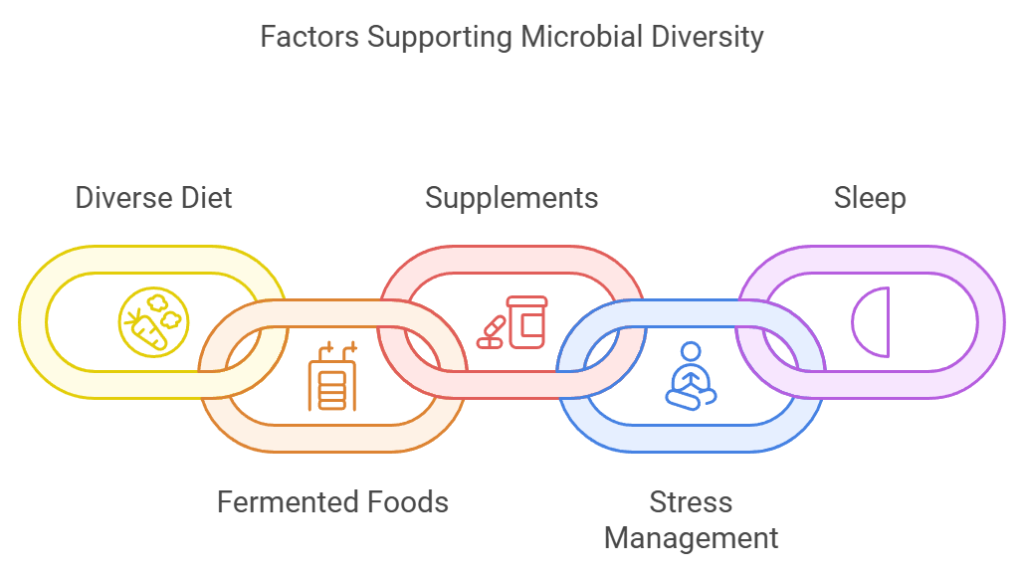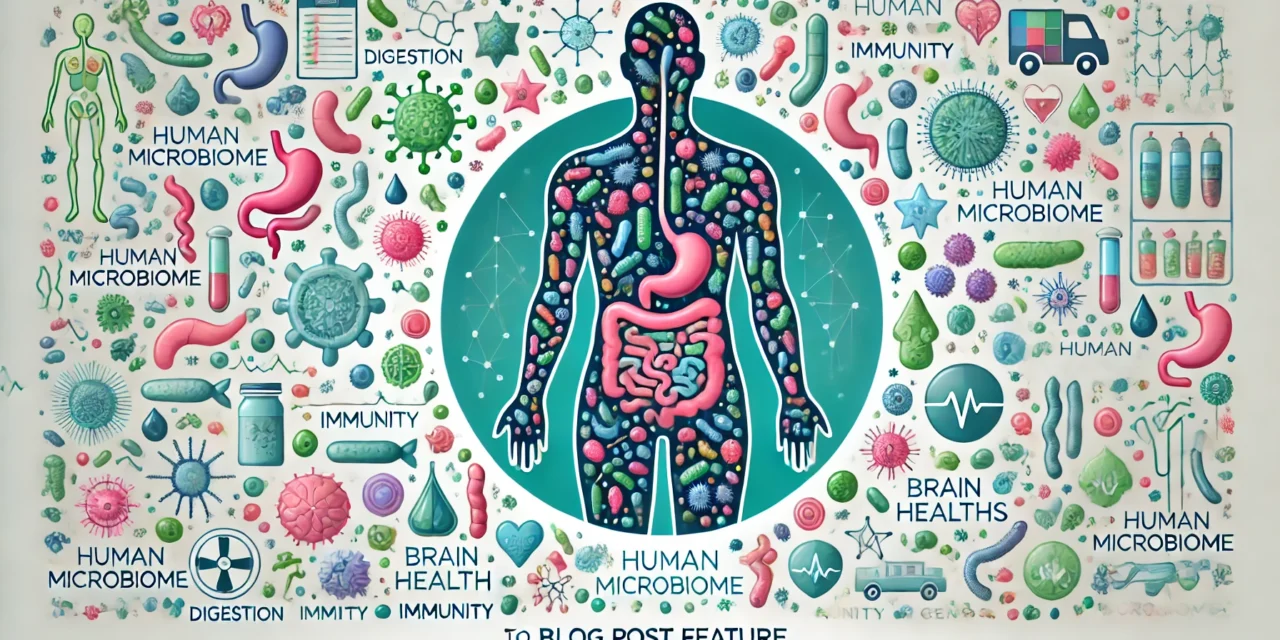The human microbiome has become one of the most fascinating fields of study in modern science, with significant implications for health and wellness. This complex ecosystem of microorganisms within the human body plays a pivotal role in digestion, immunity, mental health, and overall wellness. In this article, we will delve into the intricacies of the microbiome, how it affects our health, and the steps we can take to nurture and maintain a balanced microbiome.
What is the Microbiome?
The human microbiome is a vast collection of trillions of microorganisms, including bacteria, viruses, fungi, and other microbes, residing primarily in the gut but also in various parts of the body, such as the skin, mouth, and respiratory system. Each person’s microbiome is unique, acting almost like a microbial fingerprint. While some microbes are pathogenic, many are beneficial, helping to protect against harmful bacteria, aid in digestion, and support the immune system.
Key Components of the Microbiome
The microbiome can be broken down into specific components based on the types of microbes present. Here are the primary categories:
- Bacteria: The most abundant type, including both beneficial and harmful bacteria. Beneficial bacteria such as Lactobacillus and Bifidobacterium play crucial roles in gut health and immunity.
- Fungi: Generally less prevalent than bacteria, fungi like Candida can be beneficial but may lead to infections if overgrown.
- Viruses: While some are pathogenic, many viruses within the microbiome are harmless or may even benefit the host.
- Archaea and Other Microbes: These are less common but still contribute to the microbiome’s diversity.
Diagram: Microbiome Composition
How the Microbiome Affects Health
A balanced microbiome is essential for maintaining health. The diversity of microbes plays a critical role in several physiological functions, including digestion, immunity, and mental health. Disruptions to this balance, known as dysbiosis, have been linked to various health issues.
1. Digestion and Nutrient Absorption
The microbiome assists in breaking down complex carbohydrates, proteins, and fibres, which aids in digestion and allows the body to absorb essential nutrients. Certain bacteria produce short-chain fatty acids (SCFAs), such as butyrate, propionate, and acetate, which support gut health by nourishing the gut lining and reducing inflammation.
2. Immune System Support
The gut houses approximately 70% of the body’s immune cells, with a healthy microbiome acting as a shield against pathogens. The microbiome educates the immune system, helping it to distinguish between harmful invaders and harmless substances. Dysbiosis has been associated with autoimmune conditions, allergies, and increased susceptibility to infections.
3. Mental Health and Brain Function
The gut-brain axis is a bidirectional communication network between the gut and the brain. Research suggests that gut bacteria can influence neurotransmitter production, affecting mood, stress response, and cognitive function. Imbalances in the microbiome have been linked to mental health conditions such as depression, anxiety, and even neurodegenerative diseases.
4. Metabolic Health
A healthy microbiome can aid in maintaining metabolic balance by influencing insulin sensitivity and energy regulation. Studies have shown a link between microbial diversity and obesity, with certain gut bacteria playing a role in body weight management.
Factors That Disrupt the Microbiome
Several lifestyle and environmental factors can negatively impact the microbiome, leading to dysbiosis. Some of the most common disruptors include:
- Antibiotics: Broad-spectrum antibiotics can eliminate both harmful and beneficial bacteria, leading to imbalances.
- Poor Diet: Diets high in processed foods, sugar, and unhealthy fats may reduce microbial diversity.
- Stress: Chronic stress has been shown to alter gut microbiota composition, potentially increasing harmful bacteria.
- Lack of Sleep: Inadequate sleep can impair microbial balance, impacting immune function and metabolism.
- Environmental Toxins: Exposure to pollutants, pesticides, and chemicals may disrupt microbial health.
Steps to Support and Rebuild the Microbiome
A balanced microbiome can be cultivated through dietary and lifestyle changes. Here are some science-backed strategies to improve gut health and foster a diverse microbial community.
1. Eat a Diverse, Fibre-Rich Diet
Diets rich in diverse fibres support the growth of beneficial bacteria. Foods like whole grains, fruits, vegetables, nuts, and seeds provide the essential fibres that microbes use to produce SCFAs, supporting the gut barrier and reducing inflammation.
2. Include Fermented Foods
Fermented foods like yoghurt, kefir, sauerkraut, kimchi, and miso contain live probiotics, which introduce beneficial bacteria into the gut. These foods help increase microbial diversity and can improve digestion and immune function.
3. Consider Probiotic and Prebiotic Supplements
Probiotics introduce beneficial bacteria, while prebiotics (fibres that feed beneficial bacteria) support existing gut microbes. Some of the best-researched strains include Lactobacillus and Bifidobacterium, which may improve gut health and immunity.
4. Manage Stress Levels
Stress management techniques such as mindfulness, meditation, and regular exercise can positively impact gut health. By reducing stress hormones, these practices may prevent microbial imbalances that are associated with chronic stress.
5. Get Adequate Sleep
Sleep is essential for maintaining a balanced microbiome. Aim for 7-8 hours per night to support overall health, as sleep deprivation has been linked to dysbiosis and inflammation.
The Importance of Microbial Diversity
Microbial diversity is a cornerstone of a healthy microbiome. A diverse microbiome is more resilient, able to adapt and respond to environmental changes, pathogens, and disruptions. High diversity can be achieved through varied diets, exposure to different environments, and a lifestyle that minimises unnecessary use of antibiotics and medications.

Signs of a Healthy Microbiome
A well-balanced microbiome is associated with several positive health markers. Here are some signs that indicate a healthy gut environment:
- Good Digestion: Regular, comfortable digestion with minimal bloating or discomfort.
- Strong Immunity: Fewer infections and a robust response to pathogens.
- Stable Mood and Energy Levels: Less mood swings and consistent energy due to balanced gut-brain communication.
- Healthy Weight Management: A stable weight, reflecting efficient metabolic function.
Microbiome Testing: Assessing Gut Health
For those looking to gain a deeper understanding of their gut health, microbiome testing can provide insight into microbial composition and diversity. These tests can help identify imbalances and guide dietary and lifestyle interventions for targeted support.
Microbiome testing options range from at-home kits that analyse stool samples to more comprehensive laboratory analyses. However, it’s essential to consult with healthcare professionals to interpret results accurately and develop an effective plan.
Conclusion
The microbiome is a dynamic, complex ecosystem essential to overall health and well-being. From aiding in digestion to supporting immune function and influencing mental health, a balanced microbiome is crucial for a healthy life. By understanding and nurturing this microscopic community, we can take control of our health, promote resilience, and prevent disease. With simple, proactive steps—like eating a fibre-rich diet, consuming fermented foods, managing stress, and prioritising sleep—we can foster a diverse and balanced microbiome, unlocking the full potential of our body’s natural defences.











Trackbacks/Pingbacks